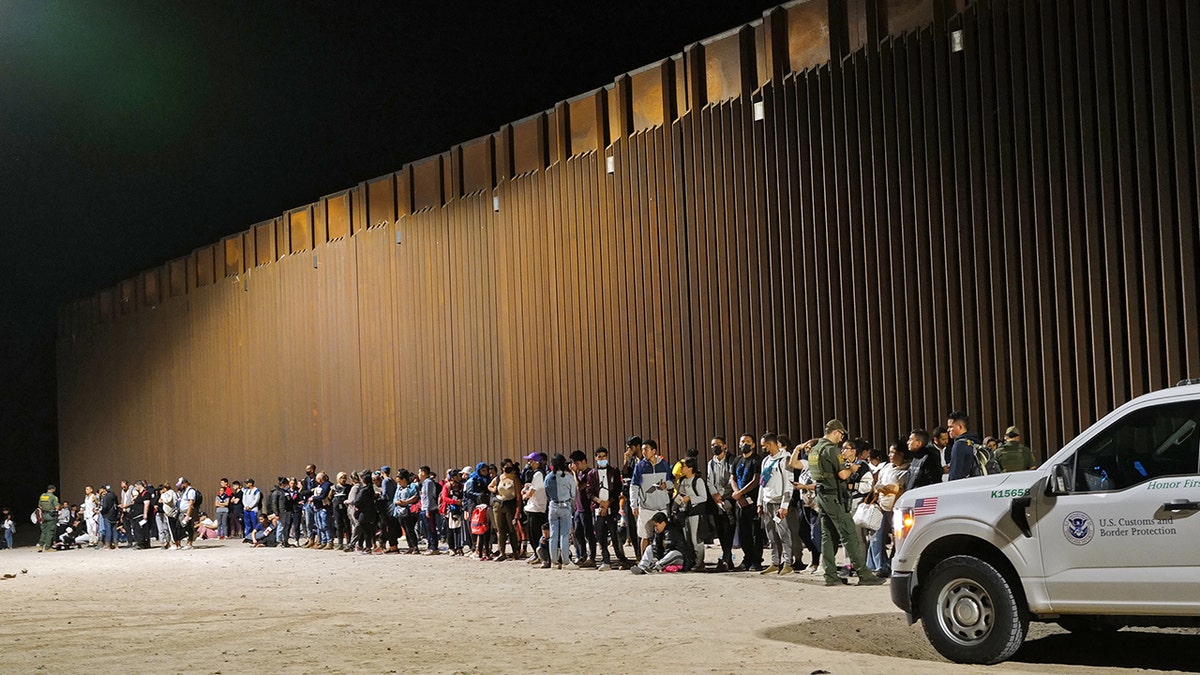Chinese migrants flooding southern border spark national security fears
Fox News' Griff Jenkins reports on the surge in Chinese nationals slipping through the U.S. southern border.
Immigration experts are raising the alarm about how the increasing flow of migrants illegally crossing into the U.S. may significantly impact states' representation in the House of Representatives and Electoral College.
Shortly after taking office in January 2021, President Biden signed an executive order requiring that the U.S. Census Bureau factor in all residents, including noncitizens, as part of its decennial calculation of the U.S. population. As a result, the apportionment of House seats and, therefore, electoral votes for presidential elections, could be swayed as migrants continue to pour over the southern border.
"Illegal immigration has all kinds of effects and among them is that it distorts the mechanics of democratic government," Mark Krikorian, the executive director of the Center for Immigration Studies, told Fox News Digital in an interview. "Illegal immigrants aren't even supposed to be here, so their inclusion in the census count for purposes of apportionment really is outrageous."
"There are a lot of close votes in Congress, more than there used to be. So, it can, in fact, make a difference," Krikorian said. "It shouldn't be a question of: Does this give you personally more influence in Washington? The question should be: Is it right? Is it healthy for our democratic process to be distorted this way? The answer is no."
REPUBLICANS PROBE DHS SECRETARY MAYORKAS OVER ROLE IN HOUSING MIGRANTS ON FEDERAL LANDS

On his first day in office, President Biden issued an executive order mandating that illegal immigrants are counted toward the U.S. census. (Getty Images)
Overall, according to the Federation for American Immigration Reform, there are an estimated 16.8 million illegal immigrants living in the U.S. as of June 2023. Therefore, because every House seat represents 761,168 residents on average, the total number of illegal immigrants account for roughly 22 seats in the House.
And the most recent census, which was conducted in 2020, reduced the number of House seats apportioned to New York from 27 to 26. The state, according to the Census Bureau, would have needed just 89 more residents to maintain its previous apportionment, a calculation that highlights how fragile states' House seat levels are.
REPUBLICANS ACCELERATE PROBE INTO BIDEN ADMINISTRATION'S ACTIONS TO HOUSE MIGRANTS ON FEDERAL LANDS
In addition, electoral votes for presidential elections are distributed to states based on how many representatives in Congress they have. Therefore, a state with a larger number of House seats has greater influence during presidential elections every four years.
"It doesn't get enough attention, and with millions coming in right now, it deserves a bright, hot spotlight," Lora Ries, director of the Heritage Foundation's Border Security and Immigration Center, told Fox News Digital in an interview.

Migrants attempting to cross into the U.S. from Mexico are detained by U.S. Customs and Border Protection in San Luis, Arizona. (Nick Ut/Getty Images)
Earlier this month, Ries published an essay alongside RJ Hauman, the president of the Immigration Center For Enforcement, warning that illegal immigration is triggering a "warped representation" in Congress.
"Barring the Census from including noncitizens in apportionment is critical in making sure that American citizens — the only population who can and should vote in U.S. elections — are picking America’s leaders," Ries and Hauman wrote. "Biden’s intentional border crisis has produced unprecedented apportionment issues, distorting the representation that states have in the House, and how many electoral votes they have in presidential elections."
The pair argued that prohibiting the Census Bureau from counting illegal immigrants toward its apportionment population would discourage sanctuary policies in Democrat-led cities and states. They further argued that such a policy would ensure that only American citizens "shape our political landscape" and prevent foreign nationals from determining the political destiny of the U.S.
Ries and Hauman also called for Congress to pass the Equal Representation Act, which Sens. Bill Hagerty, R-Tenn., Bill Cassidy, R-La., and 20 fellow Senate Republicans introduced late last month. Under the legislation, the Census Bureau would be required to include a citizenship question in any future census and prohibit noncitizens from being counted for congressional district and Electoral College apportionment.
Reps. Chuck Edwards, R-N.C., and Warren Davidson, R-Ohio, introduced companion legislation in the House days later.

Sen. Bill Hagerty, R-Tenn., introduced the Equal Representation Act in January. The bill would ensure only American citizens are factored in for future House and Electoral College apportionment. (Al Drago/Bloomberg via Getty Images)
"It is unconscionable that illegal immigrants and noncitizens are counted toward congressional district apportionment and our electoral map," said Hagerty.
"While people continue to flee Democrat-run cities, desperate Democrats are back-filling the mass exodus with illegal immigrants so that they do not lose their seats in Congress and maintain electoral votes for the presidency and hence artificially boost their political power, which in turn dilutes the power of other Americans’ votes," he added.
REPUBLICANS FUME AT BIDEN FOR VACATIONING AS BORDER CROSSINGS EXPLODE: 'DERELICTION OF DUTY'
Hagerty's bill comes years after former President Trump attempted to include a citizenship question on the 2020 census questionnaire. Trump's effort sparked widespread criticism and condemnation from Democrats and left-wing immigration groups who argued that a citizenship question was unlawful and was designed to help Republicans in future elections.
The Trump administration ultimately abandoned the effort in July 2019 after an unfavorable Supreme Court ruling. Trump said at the time that allowing noncitizens to be counted was "part of a broader left-wing effort to erode the rights of the American citizen."

"We will defend the right of the American people to know the full facts about the population size of citizens and noncitizens in America," Trump said in 2019. "It is essential that we have a clear breakdown of the number of citizens and noncitizens that make up the U.S. populations." (AP Photo/Patrick Semansky)
"It obviously helps states that have a high illegal immigrant population. The best way to say it is it's a perverse incentive to states to grow their population through illegal immigration," Eric Ruark, the director of research for NumbersUSA, told Fox News Digital in an interview. "Federal dollars are also based upon population. States who have a higher illegal immigrant population are going to see more federal funding."
"To have a democratic society, you need to recognize limits on who qualifies as a citizen or as someone who has representation," Ruark continued. "And I don't know if Americans really believe that anyone who shows up and comes over the border should be represented equally in Congress as compared to American citizens."
CLICK HERE TO GET THE FOX NEWS APP
Meanwhile, in January, the federal government reported more than 156,000 migrant encounters at the U.S. southern border, a slight year-over-year uptick but a decrease compared to the month prior. In December, more than 302,000 migrants were encountered crossing the border, by far the largest single-month figure ever recorded.
The December figures brought the fiscal 2024 first-quarter level to 785,000 encounters, the highest number ever recorded.
The U.S. Census Bureau will conduct its next census in 2030, which will impact House seats beginning in 2033.














































